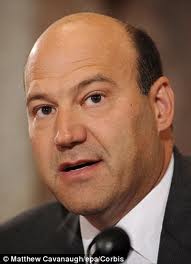Goldman Insider Exposes Struggle for Jewish Soul
March 15, 2012
 (Greg Smith, left)
(Greg Smith, left)Greg Smith, an Executive Director of Goldman Sachs in London, quit publicly Thursday due to the firm's culture of "ripping off" their own clients.
"Today, if you make enough money for the firm (and are not currently an ax murderer) you will be promoted into a position of influence."
Goldman Sachs, a part-owner of the Federal Reserve, played a key role in the 2008 credit crunch. This letter shows nothing has changed. In fact, things are worse. The bank is still marketing questionable products no matter the consequences to clients or society.
The letter also illustrates that there are two kinds of Jews: those who have a strong moral sense and those who have none. Put another way, some Jews believe in serving the world, and others believe in exploiting it.
Greg Smith, 33, is a Jew who demands the bank " Weed out the morally bankrupt people, no matter how much money they make for the firm." He blames CEO, Lloyd C. Blankfein, and the President, Gary D. Cohn, for despoiling the firm's culture.
We need more people like Smith who are willing to stand up for what's right despite career consequences. Here is a slightly abridged version of Smith's letter:
By GREG SMITH
New York Times
TODAY is my last day at Goldman Sachs. After almost 12 years at the firm -- first as a summer intern while at Stanford, then in New York for 10 years, and now in London -- I believe I have worked here long enough to understand the trajectory of its culture, its people and its identity. And I can honestly say that the environment now is as toxic and destructive as I have ever seen it.
To put the problem in the simplest terms, the interests of the client continue to be sidelined in the way the firm operates and thinks about making money. Goldman Sachs is one of the world's largest and most important investment banks and it is too integral to global finance to continue to act this way. The firm has veered so far from the place I joined right out of college that I can no longer in good conscience say that I identify with what it stands for.
It might sound surprising to a skeptical public, but culture was always a vital part of Goldman Sachs's success. It revolved around teamwork, integrity, a spirit of humility, and always doing right by our clients. The culture was the secret sauce that made this place great and allowed us to earn our clients' trust for 143 years. It wasn't just about making money; this alone will not sustain a firm for so long. It had something to do with pride and belief in the organization. I am sad to say that I look around today and see virtually no trace of the culture that made me love working for this firm for many years. I no longer have the pride, or the belief....
 When the history books are written about Goldman Sachs, they may reflect that the current chief executive officer, Lloyd C. Blankfein, (left) and the president, Gary D. Cohn, lost hold of the firm's culture on their watch. I truly believe that this decline in the firm's moral fiber represents the single most serious threat to its long-run survival.
When the history books are written about Goldman Sachs, they may reflect that the current chief executive officer, Lloyd C. Blankfein, (left) and the president, Gary D. Cohn, lost hold of the firm's culture on their watch. I truly believe that this decline in the firm's moral fiber represents the single most serious threat to its long-run survival. Over the course of my career I have had the privilege of advising two of the largest hedge funds on the planet, five of the largest asset managers in the United States, and three of the most prominent sovereign wealth funds in the Middle East and Asia. My clients have a total asset base of more than a trillion dollars. I have always taken a lot of pride in advising my clients to do what I believe is right for them, even if it means less money for the firm. This view is becoming increasingly unpopular at Goldman Sachs. Another sign that it was time to leave.
"RIPPING OFF CLIENTS"
How did we get here? The firm changed the way it thought about leadership. Leadership used to be about ideas, setting an example and doing the right thing. Today, if you make enough money for the firm (and are not currently an ax murderer) you will be promoted into a position of influence.
(Left. Gary Cohn, President. These guys all look alike!)

What are three quick ways to become a leader?
a) Execute on the firm's "axes," which is Goldman-speak for persuading your clients to invest in the stocks or other products that we are trying to get rid of because they are not seen as having a lot of potential profit.
b) "Hunt Elephants." In English: get your clients -- some of whom are sophisticated, and some of whom aren't -- to trade whatever will bring the biggest profit to Goldman. Call me old-fashioned, but I don't like selling my clients a product that is wrong for them.
c) Find yourself sitting in a seat where your job is to trade any illiquid, opaque product with a three-letter acronym.
Today, many of these leaders display a Goldman Sachs culture quotient of exactly zero percent. I attend derivatives sales meetings where not one single minute is spent asking questions about how we can help clients. It's purely about how we can make the most possible money off of them...
It makes me ill how callously people talk about ripping their clients off. Over the last 12 months I have seen five different managing directors refer to their own clients as "muppets," sometimes over internal e-mail.
Even after the S.E.C., Fabulous Fab, Abacus, God's work, Carl Levin, Vampire Squids?[References to criticism of GS's role in credit crisis. -hm] No humility? I mean, come on. Integrity? It is eroding. I don't know of any illegal behavior, but will people push the envelope and pitch lucrative and complicated products to clients even if they are not the simplest investments or the ones most directly aligned with the client's goals? Absolutely. Every day, in fact.
It astounds me how little senior management gets a basic truth: If clients don't trust you they will eventually stop doing business with you. It doesn't matter how smart you are.
DERIVATIVES
These days, the most common question I get from junior analysts about derivatives is, "How much money did we make off the client?" It bothers me every time I hear it, because it is a clear reflection of what they are observing from their leaders about the way they should behave. Now project 10 years into the future: You don't have to be a rocket scientist to figure out that the junior analyst sitting quietly in the corner of the room hearing about "muppets," "ripping eyeballs out" and "getting paid" doesn't exactly turn into a model citizen.
When I was a first-year analyst I didn't know where the bathroom was, or how to tie my shoelaces. I was taught to be concerned with learning the ropes, finding out what a derivative was, understanding finance, getting to know our clients and what motivated them, learning how they defined success and what we could do to help them get there.
My proudest moments in life -- getting a full scholarship to go from South Africa to Stanford University, being selected as a Rhodes Scholar national finalist, winning a bronze medal for table tennis at the Maccabiah Games in Israel, known as the Jewish Olympics -- have all come through hard work, with no shortcuts. Goldman Sachs today has become too much about shortcuts and not enough about achievement. It just doesn't feel right to me anymore.
I hope this can be a wake-up call to the board of directors. Make the client the focal point of your business again. Without clients you will not make money. In fact, you will not exist.
Weed out the morally bankrupt people, no matter how much money they make for the firm. And get the culture right again, so people want to work here for the right reasons. People who care only about making money will not sustain this firm -- or the trust of its clients -- for very much longer.
--
Greg Smith is resigning today as a Goldman Sachs executive director and head of the firm's United States equity derivatives business in Europe, the Middle East and Africa.
Related - Teachers Recall Smith had High Moral Standards







Robert said (March 16, 2012):
This story sure reminds me of a Monday morning meeting I had a with a corporate rep/lending officer from the Local Credit Union. I was questioning some new policy's and the direction the place seems to be going in. I was told point blank, right from the horses mouth. "We are no longer interested in community building and or the interests of individual clients" and
"An individual clients reputation is no longer considered and asset" etc
I was totally amazed.... I weep for the future.
--
(asked to elaborate)
was approaching them for project financing with specific terms, something I have done many, many times before with great success and always fulfilled my obligations.
This time I was just told no. When I asked why? the lending officer was very honest with me... he said "this isn't the same institution it used to be" "I have absolutely no power to go to bat for you based on our excellent past working relationship" "all policy and decisions are now directed by central" Again in his own words. "we basically have a bunch of young kids sitting in a board room doing risk/profit calculations, they have no idea who you are and don't care".
My interpretation of his reply was that, its not so much the fact that im now suddenly a big risk after so many years of good relations but that I'm no longer profitable "enough"